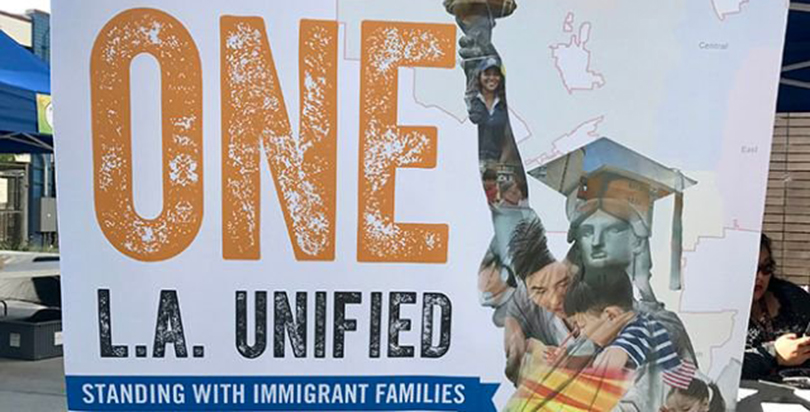Those are among the tips included in the Los Angeles Unified School District’s new “We Are One Education & Immigration Resource Guide.” Aug. 15 was the first day of school in the country’s second-largest school district, where one-quarter of its roughly 640,000 students are either undocumented or the children of undocumented immigrants. School entrances were adorned with big banners bearing the image of the Statue of Liberty and proclaiming LAUSD’s message that it stands with its immigrant families: “We Are One LA Unified.”
The district wants to create awareness of the new resource guide and toolkit for immigrant students and families on the district’s website. As of Monday, it is now available in Spanish.
Here are 10 things immigrant families can find in the district’s resource guide to be safe at school and at home.
-
You have the right to remain silent, even if you’re not a legal citizen: As a parent and as a student, you should know that all people in the United States, regardless of immigration status, have certain rights and protections under the U.S. Constitution, including the right to remain silent if detained by law enforcement officers.
-
Don’t open the door: If a Customs Enforcement (ICE) officer knocks on your door, you have the right to not open the door. Talking to the officer through a window is safer.
-
You have a right to a lawyer — and never sign anything until you talk to your lawyer: Do not sign any documents if you are not certain about what they mean. Always speak to an attorney before signing anything given to you by ICE. You have the right to speak with an attorney. If you don’t have an attorney, look for legal advice from community organizations listed on Page 14 of the guide.
-
Every child in the U.S. has the right to attend a public school: Your children have the right to attend any public school in the United States, because all children have a constitutional right to access a free public education regardless of their or their parents’ immigration status.
-
Your school is not allowed to share personal data with the federal government: You can feel comfortable sharing your personal information with your children’s schools. That information is safe because all school districts are prohibited from providing student education records to third parties as mandated by the federal Family Education Rights and Privacy Act (FERPA).
-
Keep legal documents, and school contacts, in one place: Speak to your family members about critical information regarding legal guardianship, health records, and whom to contact at the school site. Keep your documents updated and located in a safe and accessible area, including the emergency information card that you can fill out and print from Page 10.
-
Have your “Red Card” handy: The “Red Cards” can help you defend your constitutional rights when coming face to face with an immigration officer. There is a sample of these bilingual cards in the guide. You can print them from Page 5 and have one with you at all times. If detained by law enforcement authorities, you can give or read the cards to them.
-
Create an emergency ICE family checklist: You must have a plan detailing what every member of your family should do in case one of you is detained by ICE. Follow the checklist on Page 6 and make sure you are ready with information and documents you and your family need.
-
Five things to do if a family member is detained: There is a five-step checklist on Page 11 of the guide that can help you prepare for when a family member is detained by immigration authorities. If you are not sure if your relative was detained, you can find out by calling the ICE Online Detainee Locator for more information at 1-888-351-4021. If you are a minor, ask an adult to call for you.
-
Help your siblings if your parent is detained: If you are a student and you believe one of your parents or guardians has been detained by ICE, consult immediately with a school administrator for support in contacting your siblings’ schools to arrange for a plan for you and your siblings to follow. Then contact the caregiver your parents designated for you and your siblings. There is more information to help you on Page 12 of the guide.
Get stories like these delivered straight to your inbox. Sign up for The 74 Newsletter


;)
